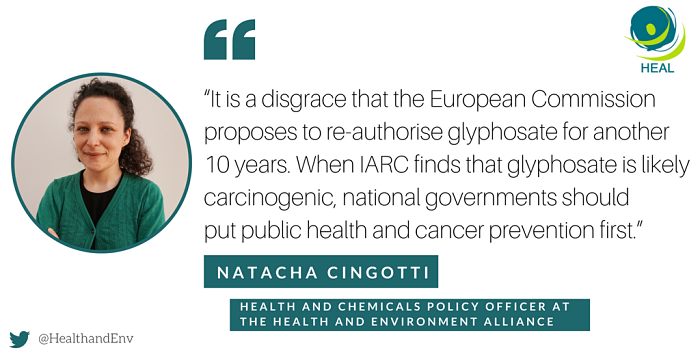*1.3 Million Europeans call for ban in fastest growing citizens’ initiative*
Newswise — Brussels,19 July 2017 - Citizens toppled a giant glyphosate bottle at the Schuman roundabout outside the European Commission to symbolise the demand of over 1.3 million people across Europe calling for a ban of the controversial weedkiller [1].
At the same time, EU members states were meeting to discuss the licensing of glyphosate in the European Union [2]. The debate over its future prompted the fastest growing European Citizens’ Initiative in history; it demands an end to its use, an overall reduction in pesticide use, and more transparency in their safety assessments.
David Schwartz, ECI Coordinator at WeMove.EU said: “There is more than enough scientific evidence of glyphosate’s health and environmental harm to justify a ban. Over one million Europeans are asking for a glyphosate ban and a transition to a pesticide-free future. Every day, organic farmers are showing that it is possible to be productive and profitable without pesticides. It is high time our governments listen to their citizens, dismiss industry-peddled information and reject the Commission’s proposal to keep glyphosate on the market for another ten years.”
The European Commission is proposing relicensing glyphosate for ten years, despite the UN’s independent cancer experts, IARC, saying that it is a “probable” cause of cancer. California has recently added glyphosate to its list of chemicals that can cause cancer.
Natacha Cingotti, Health and Chemicals policy officer at the Health and Environment Alliance (HEAL) said: “Scientific tests in several countries have revealed the omnipresence of glyphosate in our environment and organisms, meaning all Europeans are likely to be contaminated and at an elevated risk of cancer. When the WHO specialised cancer agency IARC finds that glyphosate is likely carcinogenic, it is a disgrace that the European Commission proposes to re-authorise this toxic pesticide for another 10 years. Public health advocates urge national governments to take their responsibility and put the protection of public health and cancer prevention first.”

Serious concerns have also been raised about the corporate capture of the glyphosate regulatory process. The inspector general of the US Environmental Protection Agency (EPA) has launched an investigation into potential collusion between a former senior staff member and Monsanto, the world’s biggest glyphosate producer. Additional information suggests that that the same EPA employee played an improper role in the European safety assessment of glyphosate.
The European Food Safety Authority (EFSA) and the European Chemicals Agency (ECHA) have said glyphosate is unlikely to cause cancer, but have pointed to serious environmental damage caused by the chemical. EFSA is also currently assessing evidence that glyphosate disrupts the human hormone system [3].
Dr Christopher Portier, one of ninety-six independent scientists who publicly stated that the EFSA assessment is not supported by the evidence submitted, also warned that EFSA and ECHA failed to identify numerous tumour findings in the confidential industry-submitted animal studies. EFSA and ECHA responded that the studies “have been adequately considered and therefore [they] see no need for [their] evaluations to be revisited”.
Notes
[1] In February 2017, a coalition of civil society organisations launched a European Citizens’ Initiative calling on the European Commission to ban glyphosate, reform the EU pesticide approval process, and set mandatory targets to reduce pesticide use in the EU. In just four months, over 1.3 people have called on the European Commission to ban the use of glyphosate.
[2] The EU licence for glyphosate runs out at the end of 2017. The European Commission has proposed renewing EU approval for another 10 years, based on the EFSA and ECHA evaluations. For more detailed information, please refer to this timeline of past and future events in the glyphosate decision-making process.
[3] The European Food Safety Authority (EFSA) has identified a high long-term risk to mammals, and a high long-term risk to birds arising from pre-planting and pre-harvesting uses. The European Chemicals Agency (ECHA) has classified glyphosate as “toxic to aquatic life with long lasting effects”.
Contacts:
Natacha Cingotti – Policy Officer, Chemicals and Health, Health and Environment Alliance (HEAL), +32 (0)2 234 36 45, [email protected]
David Schwartz – ECI Coordinator, WeMove.EU, +32 (0)486 07 83 42, [email protected]
Daniel Boese – Media Campaigner, Avaaz, +49 177 840 5700, [email protected]
Originally posted on 19 July 2017